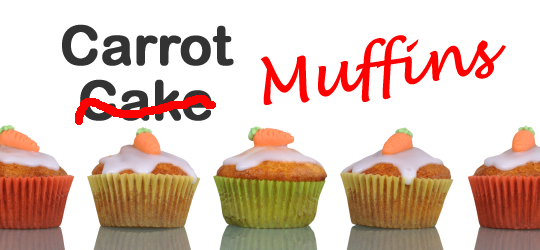The Power of Positive Names
Most of us don’t give much thought to what we call our product, at least in terms of category. Toothpaste is toothpaste. Cars are cars. Perhaps it’s time that other businesses learn what many restaurants already know: what you call a product affects its appeal and sales. In particular, unhealthy dishes that consumers might avoid can be made more appealing. Potato chips can be relabeled as “veggie chips,” while a pasta/vegetable combination will appear more healthy if it is called a “salad.” My personal favorite is the re-branding of “cake” as a “muffin.” None of us would order carrot cake for breakfast, but what about a nice carrot muffin? It sounds like health food, even with the layer of cream cheese frosting!
A study that will appear later this year in the Journal of Consumer Research shows that individuals who are dieting or trying to eat healthy foods have learned to avoid some foods by name. So, they will skip a milkshake, but might still order a healthier-sounding “smoothie.”
In fact, the researchers found that the same dish containing vegetables, pasta, meat, and cheese was rated as healthier when it was called a salad instead of “pasta.” Another test showed that subjects ate more “fruit chews” than “candy chews,” even though the product was the same.
Beyond Food
I’m sure that every industry has some examples of transformative naming. “Liquid soap” was around for years before “shower gel” transformed how we bathe. In some cases, like the food examples, the name is a means to shed a negative image for a product that people enjoy. Potato chips taste great, but are loaded with carbs and fat. Veggie chips taste great, have plenty of carbs and fat, but sound so much more virtuous! (In each case, product and package adjustments accompanied the renaming.)
If your sales are stalled, it may be time to think outside the box – that is, your product’s current box! If your product has any negative connotations, or even some aspect of it, like an ingredient, is problematic, renaming (and changing it a little) could be part of the solution to increasing sales. It may be difficult – if you are in the candy business, your first thought isn’t to label a product as something other than candy, or to reformulate and repackage to make the product less candy-like. Nevertheless, some creative reflection may give you a “new” product that is closer to what your customers are looking for. (It goes without saying that creativity is good, but not so much creativity that you misrepresent the underlying product!)
What examples of creative renaming have YOU encountered?

